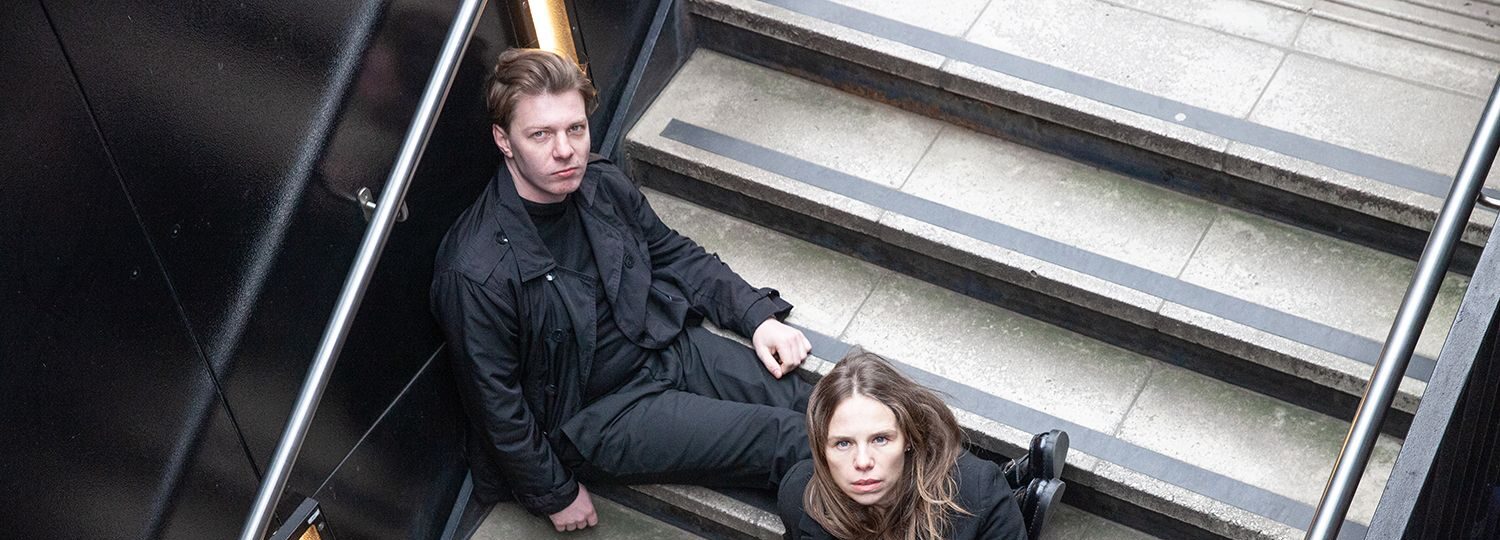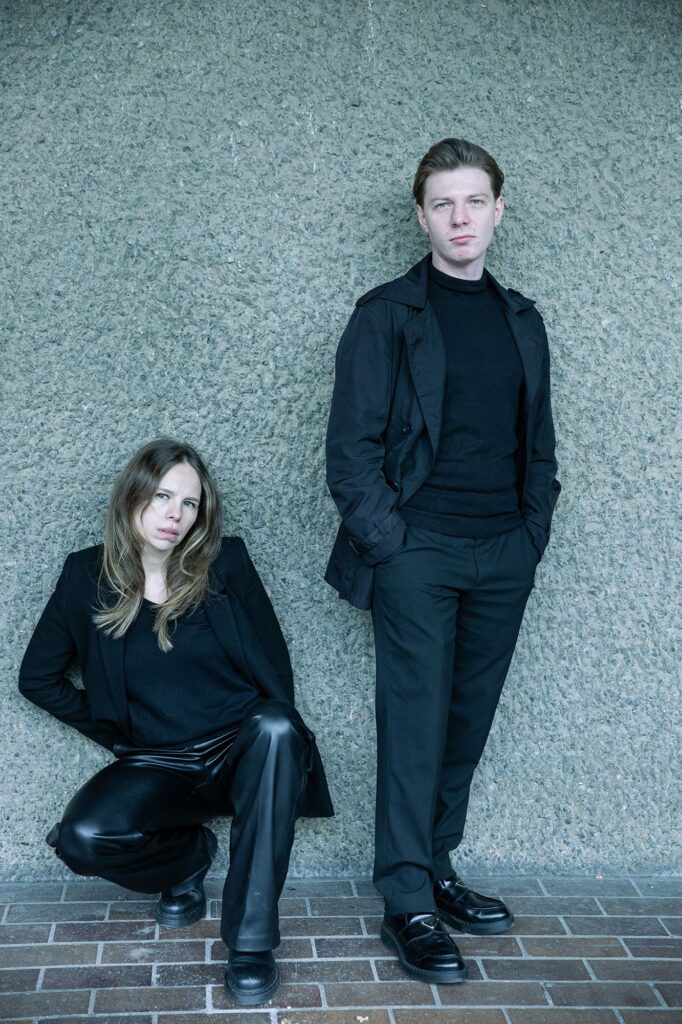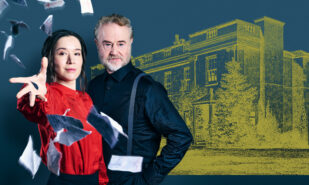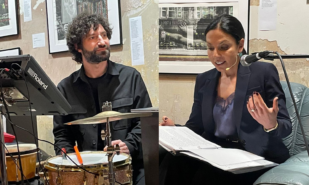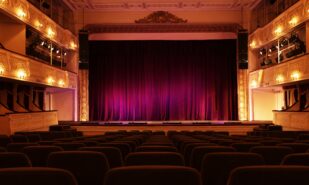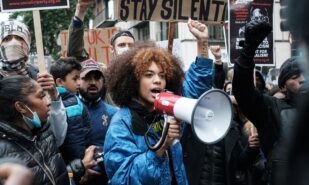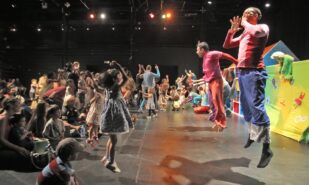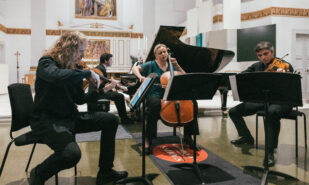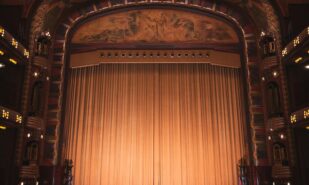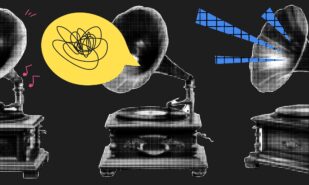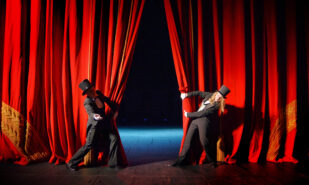“The Sound of Absence”: “Our grief is not about grief!”
This Saturday, May 24, the play The Sound of Absence will be performed at Omnibus Theatre. Mournful and funny, tragic and light – everything is mixed here. This unusual theatrical experience is created in the space of a black box by two performers: actress and author of the text Yanina Hope, and composer and pianist Vladislav Kuznetsov. But the creative team is larger: director Ivanka Polchenko, choreographer Anna Korzik, and producer David Roizengurt. We met with the entire team after a rehearsal, and the group felt more like a rock band about to embark on their first big tour.
– Whose idea was the play?
Yanina: I wanted to create a story based on personal experiences and present it in a theatrical solo format. Solo performances are in demand now for many reasons. I thought for a long time about what topic I could sustain interest in over time, one that would be accessible and understandable to audiences. I decided to talk about grief – many people go through it for various reasons these days. It seemed like an important and universal topic that anyone, anywhere in the world, could relate to. My father passed away a few years ago. We hadn’t lived close for many years, and I thought I had come to terms with his passing. But at some point, I realized that it had actually been an extraordinary event for me – and that feeling had stayed with me. So I wrote a text about the five stages of grief, according to the theory of psychologist Elisabeth Kübler-Ross – denial, anger, bargaining, depression, and acceptance. Vlad and I discussed the idea, and that’s how our collaborative work on the text and music began.
Vlad: I had been mulling over the idea of a project like this for quite a while too. I had participated in poetry readings structured as poem-music, poem-music. For example, I would play Children’s Album while poems for children were read. It worked well – I chose the music myself to fit the poems. But then I saw a few productions where music was not just an accompaniment, but a fully integrated participant. And later, I went to hear Henryk Górecki’s Symphony No. 3, the Symphony of Sorrowful Songs – music from the 1990s. I was expecting a symphony performance by an orchestra, but instead I saw a whole theatrical production built around the music. That’s when I really wanted to create a show where music would play one of the key roles – not just background for a play, and not a concert for the sake of the music, but an equal symbiosis. This idea would come and go, and then one day Yanina showed up – and it started. I’m not good at initiating processes, but she is.
Yanina: We soon realized we needed a director who could work well with contemporary text. I called Ivanka after having seen her play Vanya Lives. That’s how Ivanka got involved in editing the script.
Ivanka: We cut a lot, but we also added a lot. I told you back then: “Yanina, this is great, but you need to be even braver and take it to the end – you can’t stop halfway. It’s very important to reframe the protagonist’s personal relationship with her father. Our grief is not about grief.” The father figure is fascinating and multifaceted – if we had tried to invent such a character, I don’t think we could’ve done better. This is a perfect example of how life itself provides invaluable material. We worked on this for two months, and in April we began aligning the text with the music.
Vlad: Wait, what do you mean two months? We worked on the raw text for two months, but the material has been developing for much longer. Ivanka joined and really helped us: with just the two of us, it wasn’t going too well – Yanina would fly off into her stars, and I’d drift into mine. At first I tried to adapt, but realized that wasn’t my way – our format is different. It’s a collaboration where two people exist in their own modes, but intersect to create something truly new.
Ivanka: Question for you – are you happy with what we’ve created?
Vlad: Excuse me, who’s interviewing whom here?
Ivanka: But I’m curious!
Vlad: Am I happy? Yes! Some moments turned out really well. Others… still have room to grow. There’s space to deepen the work. That’s inevitable. In some parts, the music still plays a supporting role, and I wish we could give it more space. You can endlessly refine the score – it’s an open-ended process, just like our story.
– So am I right in thinking there’s a third layer here? There’s the text, the music – and movement? Choreography?
Anna: Ivanka, you tell me how I joined the project – I don’t even know myself!
Ivanka: When I realized that next week we needed to start working in the physical space, but all we had was text and music, I invited you. I felt we had a strong connection, we had talked a lot. We needed to structure the stage space, and I thought Anelia could help. She’s a very attentive, sensitive, and professional person. The most important thing in this project is to listen to each other, and Anelia has that ability.
Anna: As a choreographer, I do a lot of work with stage movement, mainly with choirs. But honestly, I don’t see much difference between working with a choir and with drama: I don’t separate movement from space. My first degree was in architecture, so these layers are fused in my mind. There’s almost no dancing in this production. It’s work with the body in space, in relation to another body, or parts of the body relative to itself. I feel at home here – not as a choreographer, but as a movement director. It was important for me to highlight the music and text delicately, without disrupting their connection – not to barge in with a third element like: “And now let’s dance!” Our main actors are Yanina, Vlad, and… the jacket! I tried to support that structure with subtle, detailed choices. I suspect the audience will wonder where the choreography even is. And during the process, the five-part form of the “stages of grief” that Yanina mentioned at the beginning got pushed to the background, and I gently brought it back – not so much through the text or music, but through space.
– A long rehearsal period, and the show is being performed only once – this Saturday. How does that feel?
Yanina: It’s great! For me, it’s already a big personal and professional achievement – to find the strength to be honest with the audience about such painful topics. And I think we have a really good show, and we’ll perform it more than once. Saturday’s show is the natural culmination of a long process. At the same time, we’ll see what works and what doesn’t.
Ivanka: I think it all works. During rehearsal today, I got goosebumps more than once!
Yanina: An actor has to completely disconnect from their personal pain and re-enter the text anew. That’s a double job, and I physically felt how the text I wrote – a text I know letter by letter – became something else, no longer mine. I also really want to say that the whole play is a journey of acceptance. It’s a path where the protagonist learns to accept and love herself and the world – yes, through the loss of her father, through grief. And over the course of the play, her view of her father changes. That’s very important – we’re not showing frozen grief, but a journey toward light. And of course, I hope the audience appreciates our unconventional approach to the material.
David: I can say this project is a dream for a producer. I joined late – everything had already come together, and all I had to do was support the creative team emotionally and look for an audience. I’m actually a film producer, but I’ve always wanted to work in theater – it’s more human, less mechanical, and offers more emotion than the segmented stages of filmmaking. I already knew the story behind the production, but during rehearsals I got to know it even more. It’s a beautiful project, and I’m very glad I got the chance to contribute to something so alive and cool. And the story is very moving.
Anna: Interestingly, for me and for you, David, this story is just beginning. For me, this feels like a beginning – I don’t see Saturday’s show as an ending at all. Both you and I feel this very strongly. We’re like a bridge, a prelude to the future.
David: It definitely doesn’t feel like the end.

